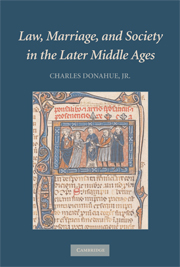Book contents
- Frontmatter
- Contents
- List of Tables
- List of Appendices
- Preface
- Acknowledgments
- Notes About This Book
- Introduction
- 1 The Background Rules and Institutions
- 2 Lying Witnesses and Social Reality: Four English Marriage Cases in the High Middle Ages
- 3 Statistics: The Court of York, 1300–1500
- 4 Story-Patterns in the Court of York in the Fourteenth Century
- 5 Story-Patterns in the Court of York in the Fifteenth Century
- 6 Ely
- 7 Paris
- 8 Cambrai and Brussels: The Courts and the Numbers
- 9 Cambrai and Brussels: The Content of the Sentences
- 10 Divorce a mensa et thoro and salvo iure thori (Separation)
- 11 Social Practice, Formal Rule, and the Medieval Canon Law of Incest
- 12 Broader Comparisons
- Epilogue and Conclusion
- Bibliography and Abbreviations
- Subject Index
- Texts and Commentary
- Table of Cases
- Table of Authorities
- Index of Persons and Places
3 - Statistics: The Court of York, 1300–1500
Published online by Cambridge University Press: 14 July 2009
- Frontmatter
- Contents
- List of Tables
- List of Appendices
- Preface
- Acknowledgments
- Notes About This Book
- Introduction
- 1 The Background Rules and Institutions
- 2 Lying Witnesses and Social Reality: Four English Marriage Cases in the High Middle Ages
- 3 Statistics: The Court of York, 1300–1500
- 4 Story-Patterns in the Court of York in the Fourteenth Century
- 5 Story-Patterns in the Court of York in the Fifteenth Century
- 6 Ely
- 7 Paris
- 8 Cambrai and Brussels: The Courts and the Numbers
- 9 Cambrai and Brussels: The Content of the Sentences
- 10 Divorce a mensa et thoro and salvo iure thori (Separation)
- 11 Social Practice, Formal Rule, and the Medieval Canon Law of Incest
- 12 Broader Comparisons
- Epilogue and Conclusion
- Bibliography and Abbreviations
- Subject Index
- Texts and Commentary
- Table of Cases
- Table of Authorities
- Index of Persons and Places
Summary
The approach that we have taken to these cases so far is the traditional historian's one of trying to tell a story. We found that it may be possible to tell stories from this type of case material, but it is difficult. The litigation context distorts the story, particularly if one is trying to tell a story of what happened, as opposed to the story of what happened in the litigation. There is a further difficulty for the historian who is seeking to discover the social context of Alexander's rules: Frequently the particular makes us lose sight of the general. We suggested that there were many cases like Dolling c Smith and like Merton c Midelton, but there are not many cases like Ingoly c Midelton. Indeed, it is the only York case I have found in which two formal marriages are dissolved on the basis of an informal precontract prior to either one of them, and it is one of only a handful in which there is such strong evidence that considerations far different from those that are found in Alexander's decisions played a dominant role in the decision. Tiryngton c Moryz may be such a case as well, but in the end, we had doubts. We were able to construct a plausible version of a story in which the precontract did happen, and of course the couple, so far as we can tell, never obtained a final judgment.
- Type
- Chapter
- Information
- Law, Marriage, and Society in the Later Middle AgesArguments about Marriage in Five Courts, pp. 63 - 89Publisher: Cambridge University PressPrint publication year: 2008



